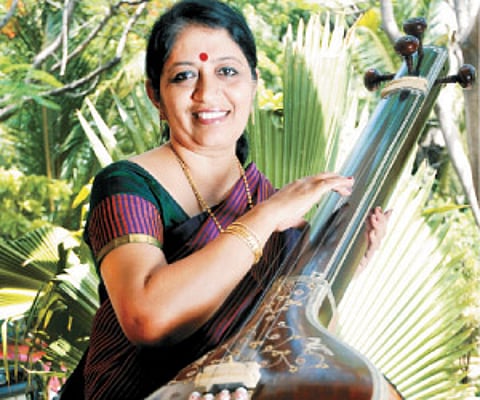

A couple of years ago, musician-friend Ludwig Pesch invited me to a music lesson taught by S Rajam. One of the disciples there was Vijayalakshmi Subramaniam. The bond between the master and the student became evident as the lesson wore on. As the midwinter sun cast lazy shadows across the courtyard, I saw the guru lapse into proud silences, letting his disciple sing unaided. Since then, I’ve come to know Vijayalakshmi fairly well.
To slot Vijayalakshmi is difficult. She is an accomplished Carnatic vocalist for over three decades. She has been teaching as far afield as the University of North Carolina and Duke University. She has also served with AIR for a long time. None of her achievements surfaces in her warm disposition. Her every word and gesture make it evident that she has a rare sense of certainty with who she is within the world of music.
Conversing with Vijayalakshmi brings forth two turning points that she holds critical to her journey. The move to Chennai, the capital city for her chosen form of musical expression, seems to have opened her mind to the infinite vistas of learning and opportunity. Was that difficult, especially since navigating the corridors of knowledge and connections within the classical world can be daunting to a newcomer? No, says Vijayalakshmi. Having teachers who were scholars rather than performers has spurred her creativity. Meeting Rajam (1919-2010) and becoming his disciple have been another critical inflexion point in her journey. Vijayalakshmi talks, almost philosophically, of Rajam’s belief that one must appreciate music of any form.
Vijayalakshmi’s singing reveres elongated phrases and in general, a gentler tempo. Her preference for accentuating straight notes has often had listeners wonder if she has had any Hindustani classical training. She replies once again in the negative, but talks of a deep sense of appreciation for the form. She has performed extensively up north as well. Vijayalakshmi has also researched Tamil composers of the 20th century for her PhD. Her acclaimed Kshetra series focuses on compositions about specific places of worship in South India.
Yet she has been a perennial student. As recently as last year, she was awarded the Fulbright fellowship to spend time with musical scholars in the US even as her perseverance has seen her being a fixture at leading festivals and performance venues.
The memory of that master lesson at Rajam’s home remains etched in my memory. As the master and the student rendered a composition in Anandabhairavi, a curious butterfly lodged itself on my shoulder. The stillness of that moment lent me a certain delicate joy. It was something deeper than contentment—an ability to stay absolutely rooted to the music. The rest, as they say, is mere noise.
(The writer is a young Chennai-based classical pianist and scholar)